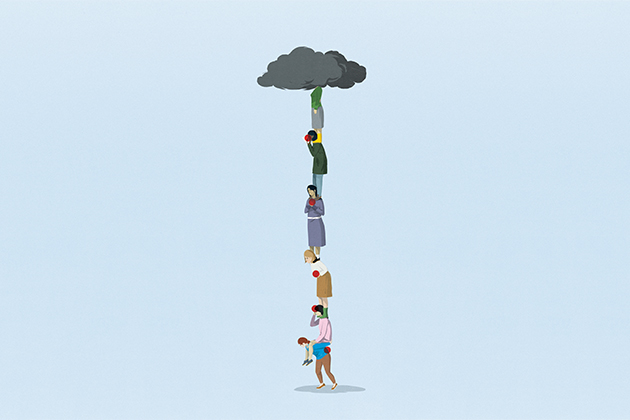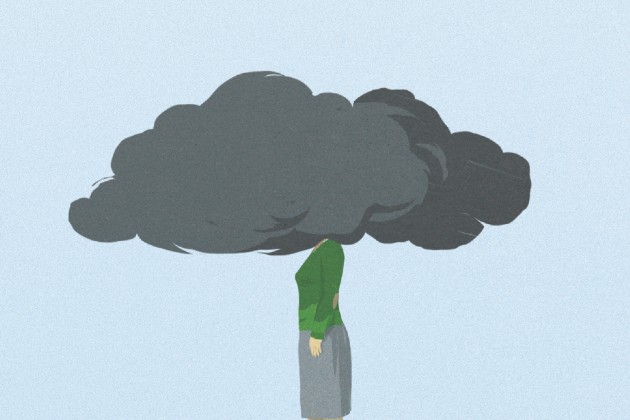Around 1.2 million people in the UK are currently suffering with long COVID, according to figures published by the Office of National Statistics (ONS) in November. Health care workers are worst affected, with 3.3% reporting ongoing symptoms more than four weeks after their initial infection, compared with nearly 1.9% of the general population. In concerning news for the nursing workforce, women and people aged 35-69 are also more likely to be suffering from long COVID.
Around 426,000 people reported that their symptoms have lasted for a year or more. Many of those say that their ability to carry out daily activities has been significantly limited. This will in turn have an impact on health services, as those suffering seek treatment.

The definition of long COVID, or post-COVID syndrome, is still broad. NICE guidance defines it as: “signs and symptoms that develop during or after an infection consistent with COVID-19, continue for more than 12 weeks and are not explained by an alternative diagnosis”.
The term “long COVID” may be being used to describe multiple conditions that patients are experiencing in the aftermath of COVID-19. This may include fluctuating multi-system symptoms, post-viral fatigue, lasting organ damage and, for those who were admitted to ICU with the virus, post-intensive care syndrome.
There have been more than 200 symptoms reported by those with the condition, covering respiratory, cardiovascular, musculoskeletal, neurological, gastrointestinal and even dermatological issues. Patients are also reporting mental health issues – predominantly depression and anxiety (read more about that here). The four most common symptoms are:
- fatigue – reported by 55%
- shortness of breath – 39%
- loss of smell – 33%
- difficulty concentrating (brain fog) – 30%.
How does COVID-19 affect your body?
COVID-19 is a respiratory disease and research demonstrates that it affects two types of cells in the lungs: those involved in gas exchange, causing patients to become hypoxic (oxygen levels drop); and those that secrete a substance that helps keep the lungs elastic, so when damaged, breathing becomes harder.

Damage to the alveoli causes an inflammatory response and cytokines are released. Cytokines are proteins that provide instructions to the immune system. Some patients release too many cytokines, activating too many immune cells, leading to hyperinflammation or a “cytokine storm”. The body starts to attack its own cells and tissues, so parts of the lung can be destroyed or damaged.
It is reported that coagulation to repair this damage can lead to clotting, which may be why some COVID patients have experienced pulmonary embolism. Plus, the virus can cause a thickening of the lung lining, making it harder to breathe.
Lasting effects
After the acute phase of illness, some of these issues can continue. Other recent research suggests that cytokine storm could be causing long COVID in some people – the ongoing autoimmune activity could be linked to fatigue. There’s growing evidence that patients are experiencing problems with energy production in the mitochondria. It is considered that this could be similar to the experiences of people who have ME or chronic fatigue syndrome.

A study has also suggested that both cytokine storm and COVID-19 entering the central nervous system could cause cerebral inflammation, leading to delirium and long-term fatigue, as well as anxiety, depression and post-traumatic stress disorder.
Some people are experiencing lasting lung damage, which could be detected via chest X-ray or CT scan of the lungs, with damage to other organs too.
Supporting and managing patients
It is recognised that accessing specialist care has not been straightforward for every long COVID patient. In October 2020, NHS England/Improvement announced a long COVID support plan, including the development of the Your COVID Recovery website, investment in post-COVID assessment services, and NIHR-funded research.
Further measures were announced in July 2021, including the expansion of assessment services, support for general practice and development of a standard rehabilitation pathway. This announcement also included a national learning network for nurses in the community and acute care, plus support for NHS staff suffering from long COVID, including mental health hubs, rapid referrals and support from occupational health. However, some of these initiatives may not be delivered until next year.

NHS England says there are now 89 post-COVID assessment clinics in England, which are receiving more than 1,500 referrals per week. These are less readily available in other areas of the UK.
NHS Wales has created a long COVID app, while the Scottish government launched an online decision support tool called SIGN Decision Support. The Scottish government has also funded research projects including one looking the impact of long COVID on NHS workers. In Northern Ireland, the Clinical Education Centre held a series of webinars to help health care staff support patients with long COVID.
The Queen’s Nursing Institute has produced a resource for community nursing staff called Living with Covid-19 (Long Covid) and Beyond. Meanwhile, NICE has created a primary care pathway for post-COVID care, with an emphasis on self-management and community support.
The British Thoracic Society has created a follow-up pathway for patients with respiratory issues. Meanwhile, the Royal College of Occupational Therapists and Intensive Care Society has created How to Manage Post-Viral Fatigue after COVID-19, offering practical advice on conserving energy, using the “Three Ps: pace, plan prioritise”.
RCN long COVID resources
- The RCN has been consulting members to find out the issues you’re facing when it comes to long COVID. With your input, we’re now developing a range of tools and resources that will help members treating patients with long COVID, as well as members who are experiencing long COVID themselves. Look out for updates coming soon and explore our existing COVID-19 resources here.
- Is long COVID affecting your ability to work? Read about your workplace rights and how the RCN can help you.
- Read about the psychological impact of long COVID on nursing staff here.








